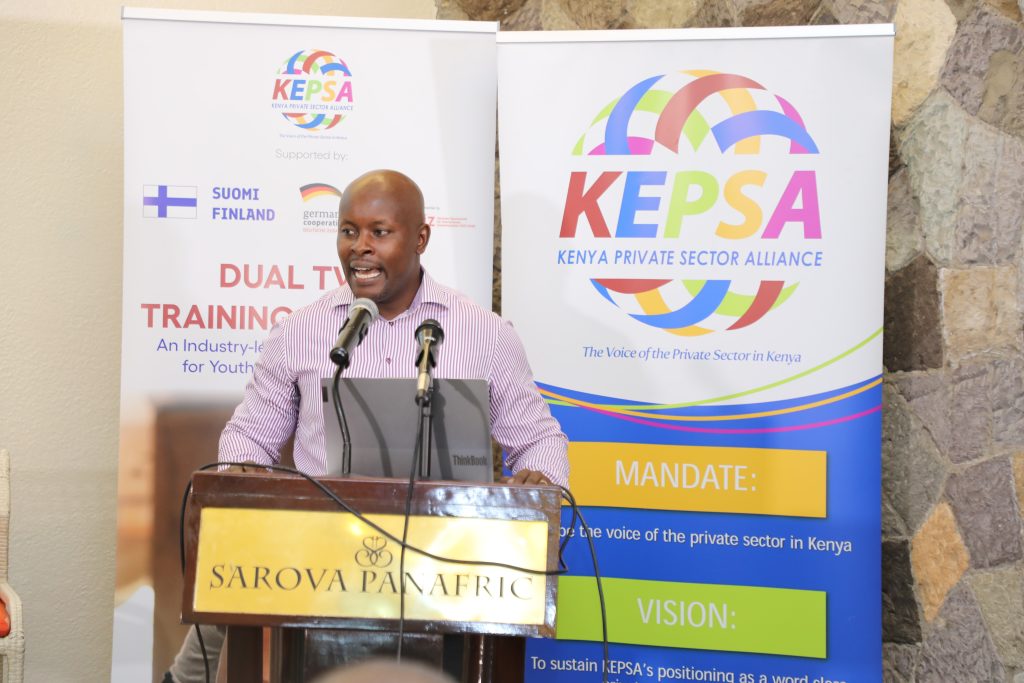
Dr. Ehud Gachugu- Director Youth and Jobs at KEPSA during the Launch of Dual TVET Program
- KEPSA Launches Dual TVET Program to Enhance Industry-Led Skilling for Youth Employability in Kenya
The Kenya Private Sector Alliance (KEPSA) in partnership with The Deutsche Gesellschaft für Internationale Zusammenarbeit (GIZ) GmbH, has announced a new partnership on the implementation of Dual training in Kenya.The partnership seeks to revolutionize skills development and enhance youth employability by bridging the gap between education and industry.
Through the programme, trainees will gain practical skills through industry training and mentorship to complement training at technical and vocational education and training (TVET) institutions.

The Program will help match businesses with the right skill set and result in improved productivity and retention rates for their employees. With a commitment to bridging the gap between education and industry, the Program will ensure that TVET curricula align seamlessly with the dynamic needs of industries. This will eventually lead to increased employment prospects for TVET graduates.
The crisis of unemployment in Kenya needs all hands-on deck to help curb and find solutions to creating more and better jobs, especially for the young people in Kenya.Last year, the Kenya National Bureau of Statistics indicated that currently, 2.97 million in Kenya are jobless with the majority of these being young people.
This then calls for empowering learners within training institutions with the competencies needed to not only excel academically but also navigate the complexities of the 21st century and fit global labour markets.Towards this, Kenya has been investing heavily in reforming the TVET sub-sector.
The government has committed over 29 billion shillings to this effort within two years to increase enrolment from 180,000 students to 1 million.
In collaboration with other stakeholders, the government is working to align TVET programmes with national goals and market needs, expand available TVET opportunities, and make them more accessible. With these initiatives, Kenya is on the path towards achieving its Vision 2030 goals and becoming a prosperous and competitive nation.
In a speech by Dr. Esther Muoria, the Principal Secretary State Department of TVET which was read by Joseph Njau, Director of Vocational and Technical Education, stated that the concept of dual training has been in existence and practiced in several developed countries over decades. It has proven to be a stronger strategy for imparting practical skills to trainees, as well as one of the best ways to
recruit competent trainees since they are trained in industry, by industry, and for industry. “I acknowledge with commendation, the key role played by our international development partners from the Governments of Germany and Finland through the GIZ-Project, which is supporting the implementation of a Dual Training Program in TVET institutions from an initial pilot of 7 institutions to an increased target of 60+ plus institutions by 2026.
It is through this collaboration that so far, dual training has taken shape in 26 institutions, with 265 industries onboarded and 513 trainees’ capacity built in Nairobi, Coast, and Western regions,” said Dr. Muoria.Priscilla Kerebi, Vice Chair of KEPSA’s Education Sector Board (TVET),reiterated KEPSA’s steadfast dedication to supporting the Dual TVET Training Program and championing the cause of youth empowerment.

With unwavering resolve, she emphasized the indispensable role of private-public partnerships in driving progress in the TVET sector. She highlighted KEPSA’s pivotal role in fostering partnerships and driving economic growth and lauded the for its ability to bridge the gap between academia and industry,promising innovation and prosperity.
She also urged industry players to embrace collaboration and commitment to excellence, envisioning a future of empowerment and opportunity for Kenya.This conversation is quite timely and involving the private sector is key to the success of this initiative and its sustainability. Speaking at the event, Dr. Ehud Gachugu, Director of Youth and Jobs at KEPSA emphasized that industry and education must walk hand in hand to ensure our youth are equipped with the skills needed for their success, benefit to businesses and the economy at large.
Hence, collaboration between the private sector and TVET institutions is paramount in achieving this goal. He further explained that the leading cause of youth unemployment is the deficiency in employability skills among young individuals, as highlighted by the notably lower unemployment rate of 12.5% for those with Technical and Vocational Education and Training (TVET) education.
These findings align with employers’ assertions of a significant skills mismatch in comparison to available job opportunities.
Consequently, investing in TVET training emerges as a promising and effective strategy for bolstering youth employability and mitigating unemployment.
Matts Weurlander,Counsellor for Skills Development and Job Creation at the Embassy of Finland, reassured Finland’s unwavering support for the Dual Training Program and deep commitment to empowering Kenyan youth and enhancing their employability prospects. He also highlighted the benefits of dual training and underscored the pivotal role of international cooperation in advancing Technical and Vocational Education and Training (TVET), painting a vision of a collaborative landscape where boundaries dissolve, and partnerships thrive.
“We live in a dynamic world where for example technologies such as Artificial Intelligence have disrupted a lot in the industry. Hence a call for flexible approaches that change with time.
The private sector should therefore be in a continuous dialogue with the institutions of education to exchange ideas on how the labour market needs to adopt as well as the relevant skills.This will not only benefit the young people and students but rather is a cost-saving mechanism for businesses as they get to access quality and refined talents, saving on the cost of retraining at the organizational level,” said Matts.
Barbra Akoth a student from Nairobi Technical Training Institute and one who is benefiting from this Dual Training Program explained that as students of TVET institutions, they greatly benefit from partnerships with the private sector as they get opportunities to access industry knowledge firsthand.
She continued to say that such collaborations provide them with invaluable practical experience, equipping them with the skills necessary to excel in their chosen fields and contribute meaningfully to the workforce.
The Dual Training Program Partnership Launch also served as a platform for stakeholders to come together, exchange ideas, and forge alliances towards a common goal: empowering Kenyan youth through quality vocational training and industry-relevant skills development.
By bridging the gap between academia and industry, this program represents a seismic shift in how we approach talent acquisition and development. This Program is about reimagining traditional onboarding processes, transforming classrooms into crucibles of innovation, and equipping our trainees with the skills, knowledge, and mindset needed to thrive in the ever-evolving landscape of the modern workforce.
It is made possible through joint financing from the Ministry for Foreign Affairs of Finland and the German Federal Ministry for Economic Co-operation and Development (BMZ).
It seeks to equip over 6,000 Kenyan youth, including 40% women and 1% persons with disabilities, with skills to enhance employability and contribute to Kenya’s economic growth.











1 thought on “KEPSA unveils Dual TVET Program to Enhance Skills for Youth”